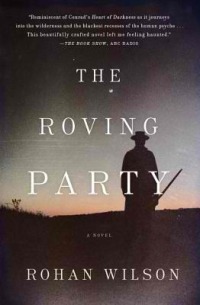The Roving Party by Rohan Wilson
 Monday, April 7, 2014 at 9:06AM
Monday, April 7, 2014 at 9:06AM 
First published in Australia in 2011; published by Soho Press on February 25, 2014
Manalargena, the chief of an Aboriginal clan in Tasmania, knowing his clan must fight to survive, recruits Black Bill to join them. Bill declines on the ground that he follows the direction of a white man, John Batman. Bill fails to mention that Batman, intending to collect on a contract from the governor, has already engaged him to hunt Manalargena and his clan, earning a bounty for each one killed or captured. Yet Manalargena, a witch who "has a meanness even God won't forgive," is believed to be (and believes himself to be) protected by a demon. He is not an easy man to kill.
Bill joins the roving party, nine men (including four convicts and two free blacks) following John Batman's lead. They are hard, rough men, cruel men who have been treated cruelly. They fight each other as often as they fight the tribesman they hunt. They regard the Aborigines as uncivilized savages but they are hardly exemplars of civil behavior. Bill, the toughest of them, stands above the fray, but as "a black man raised white" he finds little acceptance among the other members of the roving party. Bill is earning a share of the bounty to hunt his own people, a decision that even Batman's white employees cannot respect. Katherine, Bill's pregnant wife, does not approve of his decision to follow Batman, despite the food his employment puts on the table.
The Roving Party is a fast moving story of violence, but much of the dramatic tension comes from Bill's internal conflict, the doubt that gnaws at him despite his best efforts to ignore his conscience. Although raised and educated by a white family, Bill knows himself to be rooted in those he has been assigned to capture and kill. After the hunt ends, its impact on Bill -- misfortune that he attributes to Manalargena's witchcraft -- continues to drive the story to its powerful conclusion. This is, in a sense, an unconventional story of redemption. It is also a story of a man's struggle to find himself.
The men in the roving party are not academically inclined, but they consider weighty philosophical issues as they hunt their fellow man. Why are the clansmen more deserving of death than the hunters? How do men of any race learn to suffer life with dignity? Do wretched men who commit heinous crimes deserve to have their lives ended by a rope around the neck, their sentences pronounced by judges who "never get their hands dirty with men's blood"? Toward the novel's end, Bill ponders the relationship between strength and sorrow and the uncertain nature of justice.
Rohan Wilson paints the Tasmanian landscape in vivid brushstrokes. From tribesmen to slave traders to prisoners, Wilson's minor characters -- often described with just a few choice words -- are infused with authenticity. There are hints of Hemingway in the stark eloquence of Wilson's prose and in the masculinity that defines the story, yet the novel's strongest characters are women. The Roving Party tells a brutal story but it is a brutality tempered with tenderness and wisdom. It deserves the acclaim it has earned since its 2011 publication in Australia.
RECOMMENDED